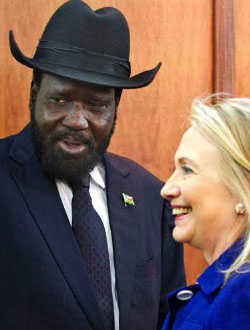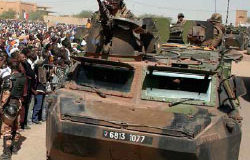To Live and Die in South Sudan

 It’s not as bad as it looks, considering the starting point and the enemy at the gate. The game can only be long
It’s not as bad as it looks, considering the starting point and the enemy at the gate. The game can only be long
The world’s newest state has not had an easy time of it. After decades of struggle against dictatorship and marginalization by successive regimes in Khartoum, independence in July 2011 brought a profound moment of joy to South Sudan’s war-weary population of roughly 10 million (the next national census is scheduled for 2014).
However, the euphoria has not lasted. The new state has faced serious crises, ranging from large-scale border issues with the Republic of the Sudan, to ever-deepening economic weakness after oil exports were temporarily shut down due to disputes with Khartoum, and significant social and ethnic unrest. Such grim challenges have raised questions about the new state’s viability, with many analysts wondering whether South Sudan has in fact been born a ‘failed state’ – created through misguided Western support and a flawed peace process – destined for the twin curses of oil and aid dependence, compounded by perpetual domestic violence and Khartoum’s bullying.
The widespread hope of the Southern Sudanese public was that a vote for independence would bring better roads, health care, education and a general sense of rising living standards. For many, this has been true, while for many more, progress feels desperately slow. South Sudan’s President, Salva Kiir, has himself publicly lamented the inability of his government to fully satisfy his people’s expectations.
The international media have presented an overly dystopian reality of manic violence, exceptional government incompetence, and endemic corruption in South Sudan. At the same time, the country has quickly become an aid darling of the West and the UN system. In the face of aggression by a Khartoum regime led by a president wanted in The Hague for war crimes and genocide, Western donors have been keen to back the Kiir government and ensure that hundreds of millions of dollars in aid continues to flow to Juba, despite strong concerns about corruption and mismanagement.
Of course, to say that South Sudan has already become a failed state obscures the fact that its previous existence as part of Sudan was not dissimilar – marked by dysfunctional governance, economic underdevelopment, and widespread violence. Indeed, its preceding condition – that of near-perpetual civil war – was often much worse than its post-independence reality. As such, there is a need to strike a balance between recognizing the very real challenges that confront the new country and acknowledging that South Sudan is a new state starting from a peculiarly disadvantaged position. Surviving 50-plus years of misrule from Khartoum would have been a burden for any population and government. Recovering from such origins will take time and, to be sure, significant international support.
Looking ahead, myopic hopes and jaded cynicism must not overwhelm thoughtful understanding of this young African state. The current problems of South Sudan have been compounded by poor decisions, corruption and mismanagement by an inexperienced government in Juba. The institutionalization of a governance culture relatively accommodating of corruption is particularly worrisome. (It is not clear that the centralization of public power in the presidency under the current temporary constitution will remedy these ills.) And, to be fair, Western governments have at times been overly enthusiastic, if not outright permissive, in their support for Salva Kiir’s government.
On the other hand, some progress is being made on the ground, and South Sudan does have a viable path ahead – even if we should not expect it to be an easy one. The country’s history dictates that the war-ravaged country will need to be built from the ground up. The near future is therefore likely to be similar to the country’s first year and a half: tensions and at times violence along the border with the Republic of the Sudan, the manipulation of proxy militia forces by Khartoum in South Sudan’s rural areas, and a weak economy largely dependent on Western aid and oil.
However, there will also be positive dynamics. From a social and political perspective, the peace process begun in 2005 was ultimately concluded through a democratic vote for secession by the South Sudanese in January 2011. This normative foundation should be appreciated – whatever wider doubts may exist about South Sudan’s strategic vocation in the world. As a historic moment of national liberation, the referendum on independence and independence itself provide significant reference points for social and political cohesion and legitimacy across the territory of the new state.
While many critics domestically and abroad have cautioned that the Sudan People’s Liberation Movement (SPLM) has too much power in the country’s political space, and while the SPLM has shown some evidence of administrative incompetence, it remains a party committed to secular democracy. Its natural instinct is not for brutal authoritarianism. Compared to what it replaced – revolving dictatorships in Khartoum – the SPLM should be given the benefit of the doubt, for the time being. Khartoum today, even after losing its southern third, still faces multiple insurgencies in its periphery, raging against the same dynamics – exploitation and marginalization by dictatorial regimes – that for so long provoked war in Sudan.
In terms of economic prospects, there is major potential for spurring development in South Sudan through the exploitation of oil and other natural resources. While foreign investment is still small, there are now active initiatives in the country to build micro-refineries in order to provide fuel for domestic and regional markets. These smaller efforts, rather than mega-pipeline projects and oil export deals, are more likely to grow the economy. Over the longer-term, substantial economic growth will need to be based on agricultural production as well as oil. For now, South Sudanese agriculture is very limited in scope. Investments in infrastructure – particularly with foreign aid – have helped to boost connectivity in the country, though as a country the size of France it remains direly lacking in roads.
Security challenges will remain dominant preoccupations for the new state, and a major burden for an already traumatized population. Without question, the country’s security situation is fragile – both in terms of its relations with its larger neighbour to the north, and across its very diverse population. (The Addis Ababa agreements of September 2012 included provisions to demilitarize the border and launch new discussions on its demarcation.) Ethnic violence – notably in the eastern state of Jonglei – is unfortunately widespread, and any ‘peace dividend’ for much of the rural population has been modest at best. Fighting in the southern part of Sudan between the Sudanese army and the Sudan People’s Liberation Army-North (SPLA-N) – the former comrades-in-arms of Salva Kiir’s own SPLA – remains a particular cause of tension between Juba and Khartoum.
South Sudan’s war for independence was a justifiable struggle against dictatorship and exploitation. Spread over decades, the South Sudanese endured exceeding brutality and deprivation in order to secure a better future. Independence was always going to be challenged by the expectations of a population desperately in need of the most basic social services, security, infrastructure and governance. Moreover, the international community has to a good extent facilitated and encouraged such high hopes through promises of quick transformations via development aid and democratization. Given the starting point, the reality was always going to be messier. South Sudan’s present is therefore correctly defined by some successes, some failures and, to be sure, non-negligible progress.
Matthew Arnold and Matthew LeRiche are co-authors of a new book, South Sudan: From Revolution to Independence.











